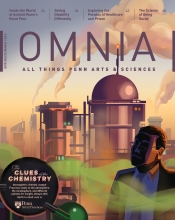The Core of the Liberal Arts
A Message from Dean Steven J. Fluharty, Dean and Thomas S. Gates, Jr. Professor of Psychology, Pharmacology, and Neuroscience.
As I’m writing this, we are approaching the end of an eventful year. The spring semester began with a topping-off ceremony for the Vagelos Laboratory for Energy Science and Technology, celebrating an important milestone in a project that is critical to the School’s commitment to advancing energy research. Accomplishments like this are only possible because of the School’s many friends and supporters. Thanks to the generosity of donors who have partnered with us to advance a range of our most important priorities, the School has had much to celebrate this spring.
The spring has also been marked by reflection at the School on the importance of disciplines across the liberal arts. While we look to science to provide new pathways to sustainable energy, we also recognize the critical need for policy conversations that reflect an understanding of humanistic perspectives. And as we react to the startling potential of generative AI, many of us are trying to grapple with what remains distinctly human. Bhuvnesh Jain and Greg Ridgeway, co-directors of the Data Driven Discovery Initiative, discuss the fundamentals of this technology in OMNIA 101: Generative AI.
As our faculty from all fields are telling us, the humanities contribute to our understanding of the human impact of critical issues, as well as our ability to communicate effectively about them and engage creatively with communities on both a local and global level. This includes vital discussion about global culture and cultural dynamics here at home—which helps our students to gain perspective and fosters a sense of belonging—and cultivating a code of ethics that we hope all our students will carry out into the world, regardless of their future ambitions.
Most importantly, the humanities provide us with a fundamental understanding of what makes us human, taking on questions of values, ethics, morality. This is reflected in Seeing Disability Differently, which examines the emerging field of disability studies from an interdisciplinary perspective.
These are just a few examples of why an education in the humanities is a pillar of a liberal arts education, and why we at Penn Arts & Sciences work continuously to ensure the relevance of our teaching. I hope you enjoy discovering more about the accomplishments of our scholars and how they are working to make the world a better place.



